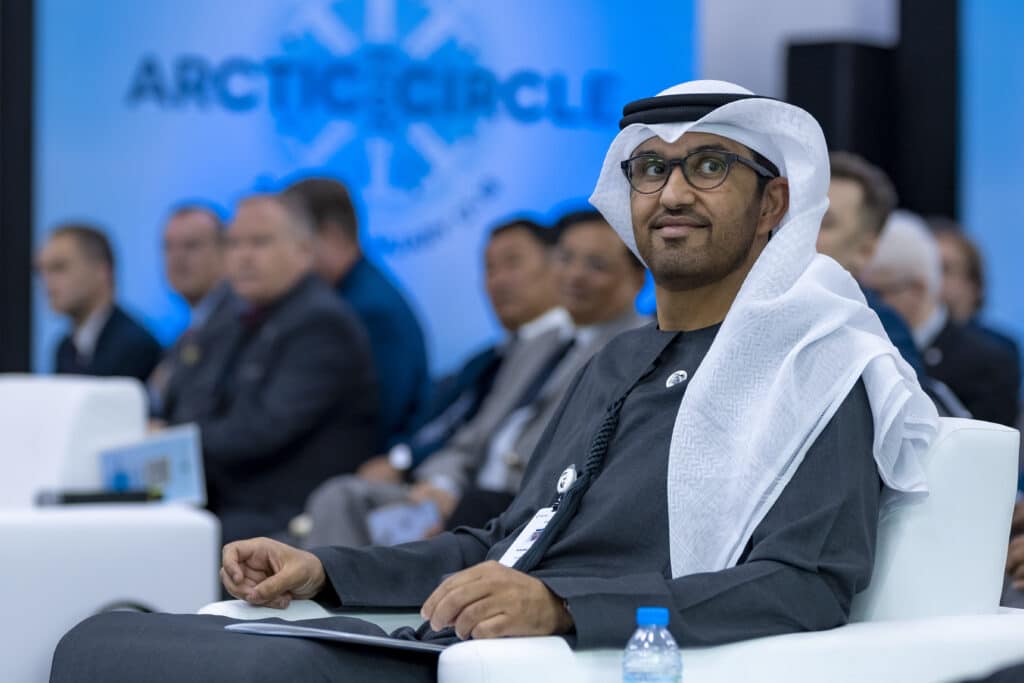The letter – signed by 99 EU and 34 US lawmakers and addressed to the leaders of their countries and the UN chief – calls for the removal of oil CEO Al-Jaber from the prestigious UN role at the upcoming COP28 summit and for urgent measures to limit the fossil fuel industry’s influence on climate negotiations.
—
133 MEPs, senators, and representatives from the United States and the European Union appealed to the heads of their countries and the United Nations to oust oil chief Sultan Al-Jaber as president of November’s COP28 climate summit.
The United Arab Emirates (UAE), COP28’s hosting nation, announced the appointment of Al-Jaber, the head of oil giant Abu Dhabi National Oil Company (ADNOC), in January. The decision has been controversial from the start.
Aside from leading the state-owned company – which pumps almost all the crude oil in the UAE and produces about 3.2 million barrels a day – Al-Jaber, is also the country’s special envoy on climate change and minister of industry and technology. As COP28 chief, he will play a pivotal role in shaping climate negotiations during the two-week conference set to begin in late November.
In the letter – which was addressed to the UN Secretary-General António Guterres, European Commission President Ursula von der Leyen, US President Joe Biden, and UN climate chief Simon Stiell – lawmakers also urged them to take immediate action “to limit the influence of polluting industries” such as fossil fuel companies and lobbyists that “lie at clear odds” with the central goals of COP summits and the Paris Agreement.
“Ahead of the annual Conference of the Parties (COP28) climate negotiations, enacting policies that expose the influence of corporate polluters in UNFCCC meetings will help ensure that climate science takes precedence over climate delay and greenwashing,” the letter reads.
According to an analysis by the campaign group Global Witness, 636 people who joined last November’s COP27 in Egypt were linked to the fossil fuel industry. That is more than the combined delegations from the 10 most climate-impacted countries. Compared to Glasgow’s summit last year, fossil fuel lobbyists joining the climate talks in Egypt rose 25%.
“When the number of attendees representing polluting corporate actors, which have a vested financial interest in maintaining the status quo, is larger than the delegations of nearly every country in attendance, it is easy to see how their presence could obstruct climate action,” lawmakers wrote in the letter.
The delegation with the most fossil fuel lobbyists at last year’s conference was from the UAE. Out of 1,070 people on the ground, 70 were found to be connected to polluting industries. Russia followed with 33 representatives, but countries like Kenya, Congo, Oman, Kuwait, Canada, Angola, and Namibia also brought their share of fossil fuel lobbyists to Sharm El Sheikh.
Meanwhile, Jaber embarked on a global tour in the build up to COP28 in Dubai. Speaking at the Petersberg Climate Dialogue in Berlin earlier this month, he outlined a plan to “supercharge” global climate finance, urging wealthy nations to deliver on a commitment made 14 years ago to donate $100 billion per year from 2020 to developing countries that are particularly vulnerable to climate change to support their climate adaptation efforts.
He also emphasised the need to phase out fossil fuel emissions, rather than production, by focussing on the development of new emission reduction technologies, effectively leaving the door open for the continued production and use of fossil fuels, which the United Arab Emirates (UAE) has repeatedly described as “key” components to a smooth energy transition. On multiple occasions, President Sheikh Mohammed bin Zayed al-Nahyan assured that the UAE would keep providing fossil fuels to countries around the world “for as long as the world needs it.”
Featured image: Wikimedia Commons
You might also like: COP28 Chief Al-Jaber Calls for Phase-Out of Fossil Fuel Emissions, Promises to ‘Supercharge’ Climate Finance


















